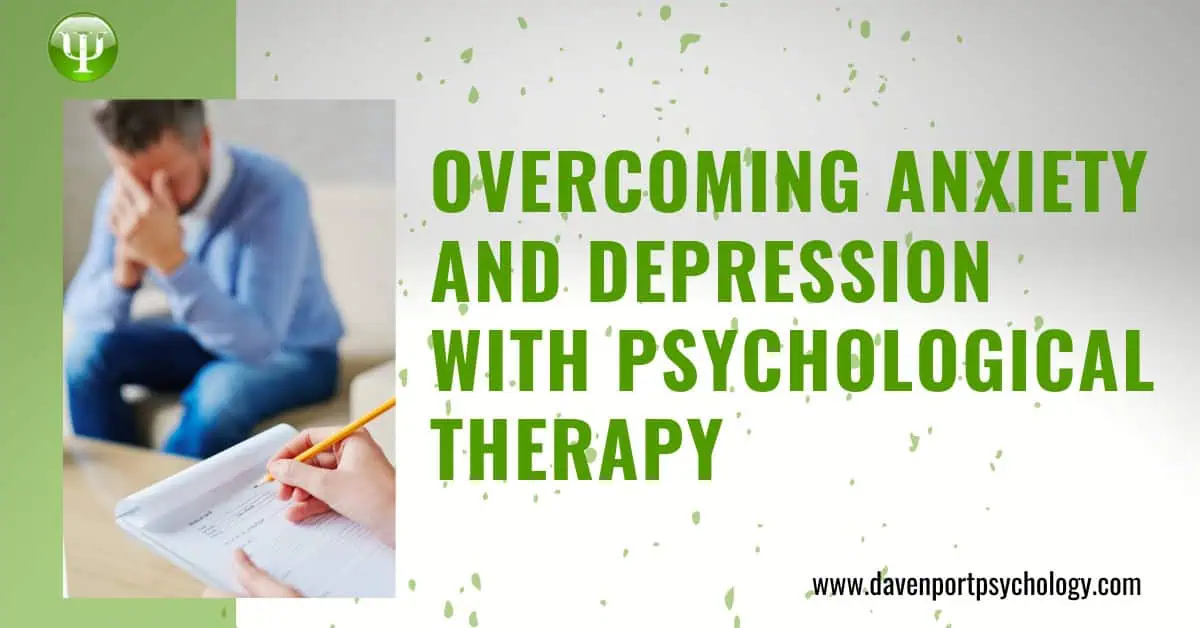Anxiety and depression are two of the most common mental health issues that people face today. While everyone experiences these feelings to some degree, they can become overwhelming and affect your daily life. Fortunately, psychological therapy can be an effective treatment option for individuals struggling with anxiety and depression. In this article, we will discuss the different types of psychological therapies available for anxiety and depression and how they can help you overcome these challenges.
Listen In
What is Anxiety and Depression Therapy?
Anxiety is a natural human response to stress, but it becomes a problem when it is excessive and interferes with daily life. Depression, on the other hand, is a persistent feeling of sadness or loss of interest in things that once brought pleasure. While everyone experiences anxiety and sadness from time to time, persistent symptoms that interfere with daily functioning may indicate an anxiety or depression disorder.
The Importance of Seeking Help
If you are struggling with anxiety or depression, it is essential to seek help. While these disorders can be challenging to overcome on your own, there are effective treatments available. Psychological therapies are a popular and successful method of treating anxiety and depression, providing patients with the tools and support they need to manage their symptoms and improve their mental health.
Why Choose Psychological Therapies for Anxiety and Depression?
-
-
-
- Psychological therapies are designed to help individuals identify and manage their thoughts, feelings, and behaviors related to anxiety and depression.
- They provide a safe and supportive environment for individuals to work through their issues and develop coping skills to manage symptoms.
- Unlike medication, psychological therapies do not have harmful side effects and can be tailored to meet individual needs.
-
-
Types of Psychological Therapies for Anxiety and Depression
-
-
- Cognitive Behavioral Therapy (CBT):- CBT is a type of psychotherapy that focuses on changing negative thought patterns and behaviors that contribute to anxiety and depression. This therapy helps patients identify and challenge their negative thoughts, beliefs, and attitudes, replacing them with more positive and realistic ones.
- Interpersonal Therapy (IPT):- IPT is a short-term therapy that aims to improve communication and relationships with others. This therapy can help patients struggling with depression, particularly those who have experienced a significant life change or loss.
- Mindfulness-Based Cognitive Therapy (MBCT):- MBCT combines mindfulness techniques with cognitive-behavioral therapy. This therapy helps patients become more aware of their thoughts and feelings, allowing them to recognize and respond to them more effectively.
- Acceptance and Commitment Therapy (ACT):- ACT is a mindfulness-based therapy that helps patients learn to accept their thoughts and feelings while committing to behaviors that align with their values. This therapy can be particularly helpful for patients struggling with anxiety and depression, as it teaches them to cope with difficult emotions and situations.
- Dialectical Behavior Therapy (DBT):- DBT is a form of therapy that combines elements of CBT with mindfulness practices and other strategies. The goal of DBT is to help clients regulate their emotions, improve their interpersonal skills, and develop a stronger sense of self. DBT is highly effective in treating borderline personality disorder, which is often accompanied by symptoms of anxiety and depression.
-
How Anxiety and Depression Therapy Can Help You
-
- Provides a Safe Place to Talk About Your Feelings
One of the most significant benefits of psychological therapy is that it provides patients with a safe space to talk about their feelings. Patients can discuss their thoughts and emotions openly and honestly, without fear of judgment or shame. - Teaches Coping Strategies
Therapy can teach patients effective coping strategies to manage their anxiety and depression. Patients can learn how to identify their triggers, manage their stress levels, and develop healthy habits that support their mental health. - Helps Improve Relationships
Therapy can also improve relationships with others. Patients can learn effective communication skills, set healthy boundaries, and constructively resolve conflicts.
- Provides a Safe Place to Talk About Your Feelings
How to Get Started with Anxiety and Depression Therapy
-
-
- The first step in starting the therapy is to find a licensed mental health professional who specializes in anxiety and depression therapy.
- It is important to choose a therapist who you feel comfortable working with and who has experience in the type of therapy that you are interested.
- Many therapists offer free consultations, so you can ask questions and get a feel for their approach before committing to treatment.
-
Anxiety and depression can be debilitating conditions that can affect all aspects of an individual’s life. However, with the right treatment and support, individuals can regain control of their lives and overcome their struggles. Psychological therapies, such as cognitive-behavioral therapy, interpersonal therapy, and psychodynamic therapy, can be highly effective in treating anxiety and depression. If you or someone you know is struggling with these conditions, consider seeking help from a licensed therapist. Visit davenportpsychology.com to learn more about the psychological therapy services offered and how they can help you on your journey to better mental health.

